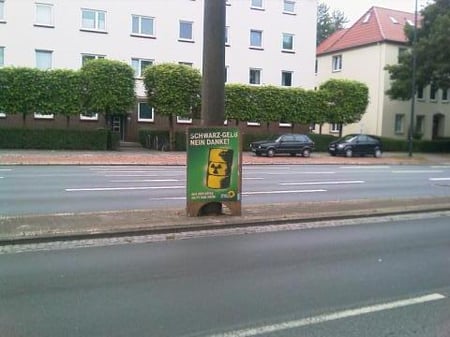By Benedict De Meulemeester on 10/09/2009
Proponents of nuclear technology have recently started using the word ‘renaissance’ to describe the renewed interest in nuclear for the production of power. The building of new nuclear power plants in Finland and France and the many plans for building in Eastern Europe are cited as evidence of this. I was therefore surprised this week to read that it is far from clear that the output of nuclear power facilities will rise in the following years.
I am in Bremen in Northern Germany at the moment where the political debate is heating up ahead of Bundestag elections (‘Wahlkampf’ is the delicious German word) to be held in four weeks. Chancellor Angela Merkel wants to bring together a CDU – FDP coalition of her own Conservatives with the Liberals, the so-called Schwarz-Gelb coalition. Leftist parties are strongly opposed to this perspective. The discussion is on evident themes such as social rights and the presence of German troops in Afghanistan. The German Green Party is adding an energy them to this discussion. As you can see in the picture below, they associate the black and yellow colors of Mrs. Merkel’s preferred coalition with the symbol of nuclear energy. The message is: vote for this coalition and the phase-out of nuclear energy in Germany will be phased back.

The debate on whether to invest in new nuclear facilities or not is extremely difficult. On the one hand, the technology looks to splendid not to use it. Producing so much energy from such small amounts of fuel, looks like the solution for all our energy needs. Moreover, a nuclear revival would reduce our dependence on hostile countries for buying fossil fuels. And this raises a thorny issue. More nuclear would also help us to reach our targets for carbon dioxide emission reductions. That nuclear energy is ‘green’ in that perspective complicates the environmental debate.
On the other hand, we have the triple danger factor of nuclear energy:
If you would ask the public, I am sure that large majorities in every country (even France) would be opposed to building new nuclear power plants. If you define democracy as implementing the policy agreed upon by the majority of citizens, the nuclear renaissance would be dead. The trouble is that the majority is not considering issues such as long term security of power supply. Politicians are supposed to do that for them (representative democracy).
And that it are politicians that decide on whether to build new nuclear power plants or not is probably the main reason that the nuclear renaissance is stalling in its starting blocks. You cannot win elections on a theme such as nuclear energy. If you could, Green Parties would have much bigger voter shares than they have now. But you can sure lose elections over the theme. The politician that decides to build a new nuclear power plant in Germany will not exactly see his popularity boosted. With elections every four years, it is very unlikely that someone will have the political gut to take that decision.
Feel free to leave a comment and share our blog posts on social media!
E&C is an energy procurement consultancy with an international team of energy experts that offer a unique blend of global capabilities and local expertise.
Our offices in Europe, the US and Australia serve more than 300 clients from South-Africa to Norway and Peru to Australia that have an annual spend between 1.5 million and 1.5 billion dollars.
E&C Consultants HQ
Spinnerijkaai 43
8500 Kortrijk
BELGIUM
+32 56 25 24 25
info@eecc.eu
